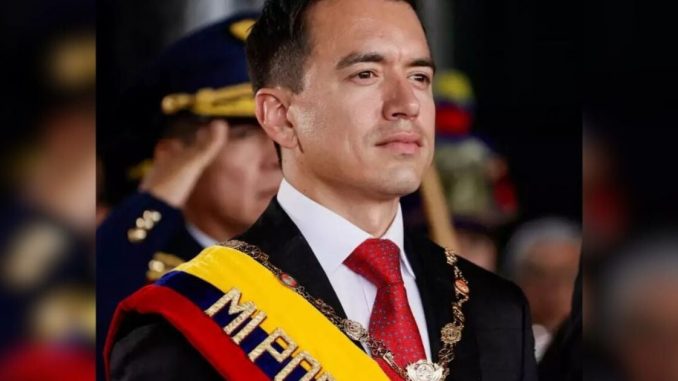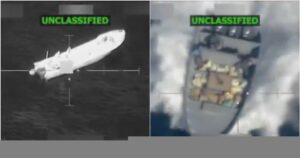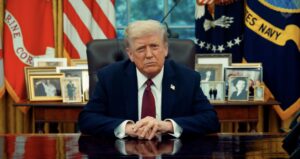
Published September 8, 2025
Ecuadorian President Daniel Noboa and U.S. Secretary of State Marco Rubio have sealed a new era of cooperation in the fight against transnational crime. Meeting at the Carondelet Palace in Quito, both leaders committed to a deeper partnership focused on security, migration, and regional stability.
During the meeting, Noboa endorsed the U.S. designation of the Cartel of the Suns as a terrorist organization, calling it a militarized, regional network tied directly to Venezuela’s Nicolás Maduro. By aligning Ecuador with this U.S. initiative, Noboa placed his country squarely within a growing coalition of Latin American governments determined to confront organized crime as a threat not only to public safety but also to democratic institutions.
Washington pledged new resources for Ecuador, including $13.5 million in security assistance and $6 million earmarked for lethal drones. This support is designed to strengthen Ecuador’s armed forces in their battle against gangs such as Los Choneros and Los Lobos, both recently branded by the U.S. as foreign terrorist organizations. The decision opens the door to sanctions, international asset freezes, and intensified intelligence cooperation.
At the same time, Ecuador has signaled readiness to serve as a “safe third country”, agreeing to host a limited number of refugees under U.S.-backed conditions. While presented as a humanitarian gesture, the move underscores how closely migration and security issues are now tied together in hemispheric diplomacy.
Beyond bilateral agreements, the U.S. has deployed a naval task force to the Caribbean, reinforcing its anti-narcotics presence and sending a clear message to regional criminal networks. Noboa welcomed this show of strength, framing it as a necessary step to safeguard Ecuador’s sovereignty and restore stability.
The joint announcement reflects a broader ideological stance as well. Both leaders stressed that organized crime thrives when governments are indecisive or permissive. Their call was for firmness, family values, and institutional order—an implicit rejection of what they described as softer, more permissive approaches to crime management seen elsewhere in the region.
For Ecuador, this moment represents more than a diplomatic handshake. It is a declaration of alignment with a U.S.-led effort to redefine organized crime as terrorism and to confront it with the full weight of state power. For Noboa, it also represents an opportunity: to project strength at home, secure resources abroad, and position Ecuador as a pivotal actor in Latin America’s security landscape.
👥 Public/Political Reactions
Domestic and Institutional Reactions
-
Indigenous and Religious Institutions:
-
The Confederation of Indigenous Nationalities of Ecuador (CONAIE) and the Ecuadorian Episcopal Conference called for national unity, urging the government to act within the legal framework. They cautioned against using the security crisis to push unpopular policies.
-
-
Former President Rafael Correa:
-
Expressed support for Noboa’s declaration of an “internal armed conflict” and backed military action, calling instead for national unity.
-
Grassroots & Social Media Sentiment
-
On Reddit, reactions are sharply divided:
-
Supporters of Noboa’s crackdown view him as a decisive leader. One user echoed a strong sentiment:
“Noboa, this guy is doing the things right … For me Noboa is the next Bukele.”
-
Critics warn of authoritarian overreach and express concern about the erosion of civil liberties:
“This ‘war against crime’ is nothing but an act that uncovers fascism practices… government and the police department are just as involved in organized crime…”
-
Others reflect skepticism toward the political class:
“Noboa belongs to a very very very rich dynasty… out of touch with the needs of the people…”
-
International & Regional Responses
-
United Nations:
-
Secretary-General António Guterres voiced alarm at the country’s deteriorating security situation and its impact on the lives of Ecuadorians.
-
-
Neighboring Countries:
-
Peru declared an emergency along its border and deployed armed forces to bolster police presence.
-
Other Latin American governments expressed solidarity with Ecuador’s government amid the public security crisis.
-
-
U.S. Support:
-
The United States extended support—through diplomatic expressions and security assistance—while emphasizing its readiness to collaborate with Ecuador’s government.
-
Political Stratification at Home
-
Supporters on the right (e.g., Pachakutik, Reto, Social Christian Party) publicly congratulated Noboa on his electoral win and backed his administration. The National Electoral Council (CNE) dismissed fraud allegations as unfounded.
-
Some opposition figures, including Luisa González, contested the election results and alleged fraud, though the CNE reiterated confidence in the process.
⚠️ Resulting Effects
🔹 Security & Military
-
Militarization of Security: Ecuador’s armed forces gained expanded powers under Noboa’s declaration of an “internal armed conflict,” leading to joint police-military operations, curfews, and more checkpoints in urban centers.
-
Drone Warfare Shift: The U.S. aid package (including lethal drones) is expected to give Ecuador unprecedented aerial surveillance and strike capacity against gangs and cartels.
-
Naval Task Force Presence: U.S. deployment of ships and Marines in the Caribbean signals a stronger regional show of force, tightening pressure on Venezuela’s Maduro regime and the Cartel of the Suns.
⚠️ Political & Diplomatic Effects
-
Closer U.S.–Ecuador Ties: Noboa is now seen as one of Washington’s most reliable allies in South America, joining Peru, Argentina, and Paraguay in aligning against narco-terrorist networks.
-
Foreign Policy Realignment: Ecuador is pivoting away from the more neutral or non-aligned stance of previous governments, firmly embedding itself in a U.S.-led security bloc.
-
Military Bases Debate: Noboa’s openness to U.S. bases in Ecuador has sparked heated debate about sovereignty vs. security, with the possibility of a referendum looming.
⚠️ Economic & Social Effects
-
Investor Confidence: Some foreign investors welcome Noboa’s hard line, expecting stabilization. Others remain cautious, fearing political backlash or escalation of violence.
-
Refugee Program: Ecuador’s role as a “safe third country” for migrants (up to 300 annually) could strain social services and fuel public debate, but it also brings U.S. financial and diplomatic incentives.
-
Tourism & Public Image: If Noboa succeeds in curbing violence, Ecuador may rebuild its international image as a safe destination—though in the short term, images of militarized cities could deter visitors.
⚠️ Criminal & Social Order Effects
-
Gang Fragmentation: Declaring groups like Los Choneros and Los Lobos as terrorist organizations enables asset freezes, international warrants, and harsher domestic penalties. But it may also push gangs to reorganize into splinters, intensifying street-level violence.
-
Retaliation Risk: With the Cartel of the Suns directly named and Maduro accused of leadership, there’s a risk of cross-border reprisals or escalation of proxy violence in Ecuador.
-
Civil Liberties Strain: Expanded military powers are raising human rights concerns—echoing criticism similar to what’s been directed at El Salvador under Bukele.
⚠️ Regional Effects
-
Border Militarization: Peru already declared an emergency along its border with Ecuador; Colombia is also heightening vigilance.
-
Ripple Effect on Venezuela: The formal recognition of Maduro as linked to a terrorist cartel isolates Venezuela further, strengthening calls for sanctions and possibly military containment.
-
Latin American Polarization: Governments aligned with the U.S. (Peru, Argentina, Paraguay, DR) are solidifying a bloc against narco-terrorism. Left-leaning governments may resist, deepening ideological divides.
🔮 Future Outlook
1. Security & Governance
-
Short-Term: Intensified military-police operations will likely reduce street-level violence in some hotspots, but gangs may respond with retaliatory attacks or shift deeper underground.
-
Medium-Term: If Ecuador successfully deploys U.S.-supplied drones and intelligence, it could replicate an “El Salvador model” of crime control—but at the cost of civil liberties debates.
-
Long-Term: Ecuador’s institutions risk becoming dependent on militarization rather than building stronger civilian policing and justice systems.
2. U.S.–Ecuador Relations
-
Alliance Strengthens: Noboa is positioning Ecuador as a strategic U.S. ally, similar to Colombia during the Plan Colombia era. Expect more military aid, intelligence sharing, and possible joint base operations.
-
Sovereignty Debate: A referendum on U.S. bases could polarize the country—between those prioritizing security and those fearing loss of independence.
3. Regional Dynamics
-
Venezuela Isolation: Labeling Nicolás Maduro as head of the Cartel of the Suns entrenches Venezuela’s pariah status. Pressure could escalate into economic blockades or even naval containment around Venezuelan routes.
-
Regional Security Bloc: With Peru, Argentina, Paraguay, and the Dominican Republic aligned, expect a Southern Cone + U.S. coalition against narco-terrorism, while leftist governments (like Bolivia or Mexico’s leadership) may resist.
4. Economic & Social Dimensions
-
Foreign Investment: If Noboa can show results, investors may regain confidence in Ecuador’s ports, mining, and energy sectors. If violence escalates, investors could retreat.
-
Migration Flows: Ecuador’s “safe third country” refugee deal with the U.S. may only be the beginning—Washington could push for higher quotas if Noboa proves compliant.
-
Public Perception: Noboa risks a Bukele-style split: high popularity among citizens tired of crime, but deep criticism from NGOs and international rights groups.
5. Risk Factors Ahead
-
Escalation with Maduro: If direct evidence of Venezuelan state-cartel ties is acted upon militarily, it could trigger a regional confrontation.
-
Political Backlash: If Noboa’s crackdown is seen as authoritarian or disproportionately affects the poor, opposition movements could gain strength in the 2025–2026 election cycle.
-
Fragmented Gangs: Declaring Los Choneros and Los Lobos as terrorist organizations may weaken leadership structures but empower smaller, harder-to-control factions.
🧩 Bottom Line:
The alliance between Daniel Noboa and Marco Rubio marks a turning point for Ecuador and the region. By labeling the Cartel of the Suns and local gangs as terrorist organizations, both leaders are reshaping the fight against organized crime into a matter of national security and sovereignty. The U.S. commitment of military aid, drone technology, and naval presence signals that Washington views Ecuador as a new frontline partner in its hemispheric strategy.
Yet, this bold approach carries heavy trade-offs. While it may deliver short-term stability and strengthen investor confidence, it risks deepening political divides at home, igniting human rights debates, and escalating tensions with Venezuela. Public opinion remains split between those who see Noboa as a decisive protector and those who fear creeping authoritarianism.
Looking forward, Ecuador stands at a crossroads: either emerge as a model of security cooperation and democratic resilience—or struggle with the unintended consequences of militarization and foreign dependency. The success or failure of this joint strategy will not only define Noboa’s presidency but could also reshape the balance of power across Latin America.
SOURCES: THE GATEWAY HISPANIC – Ecuadorian President and Trump Ally Daniel Noboa and Marco Rubio Join Forces against the ‘Cartel of the Suns’
REUTERS – US gives Ecuador nearly $20 million in new funding, drones to fight drug gangs
EL PAIS – Marco Rubio travels to Ecuador to work with Noboa to finalize the deportation of immigrants from other countries.





Be the first to comment